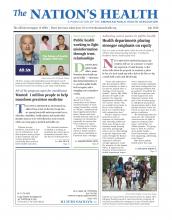In recent years, Chicago has made progress on a number of critical health metrics, from reaching a new all-time high in life expectancy to cutting new HIV diagnoses by 15 percent. But a deeper dive into the numbers showed that while overall statistics were going in the right direction, disparities by race, ethnicity and neighborhood persisted.
“We realized that if we wanted to move the needle on disparities, we’d have to shift to health equity,” Julie Morita, MD, Chicago’s health commissioner, told The Nation’s Health.
So in 2016, for the first time, the Chicago Department of Public Health explicitly called out equity in its city-wide health plan, “Healthy Chicago 2.0,” which calls for achieving health equity and reducing inequities, with a priority focus on improving social, economic and community conditions as well as on expanding community engagement. Of the plan’s 82 objectives, 25 focus specifically on population subgroups, such as people living in economic hardship and children living in areas with few opportunities for healthy development.
According to the plan, more than 835,000 Chicago residents were living in high economic hardship in 2014, a measure based on social determinants such as crowded housing conditions, poverty, unemployment and education. In addition, 48 percent of the city’s kids were living in “low child-opportunity areas,” where health, educational, environmental, social and economic factors lagged for children. One in every two black and Hispanic children lived in such areas, compared to one in 50 white children.
Chicago’s new equity journey began with workforce training and a renewed focus on cross-sector partnership. In fact, Healthy Chicago 2.0 calls for formalizing health-in-all-policies across city government, “ensuring every city agency approaches its work using a health equity lens.”
“We have to focus on the root causes of poor health,” Morita told The Nation’s Health. “But because we don’t own all the social determinants of health, it requires we play a role as chief health strategist to engage partners and encourage them to consider health.”
Already, the equity shift is resulting in real, potentially life-saving change. For example, last year, the city announced a new Flexible Housing Subsidy Pool, a cross-agency partnership that combines housing assistance and supportive health services for homeless residents who may not qualify for more traditional housing subsidies via the U.S. Department of Housing and Urban Development. Knowing that stable housing has been key in improving outcomes for residents living with HIV and tuberculosis, Morita said the public health department is working to ensure the new housing program reaches those with severe mental illness and addiction.
“This is a holistic approach,” she said. “We even think we can get health systems to contribute to the new pool because they’ll recognize that by housing these individuals, health care use and costs will go down and health will improve.”
Morita noted that the shift toward equity is opening up a new world of opportunity for improving health in Chicago. But, she said, public health cannot do it alone.
“It feels like there’s a new openness and readiness to start talking about health equity,” she said. “But to really do it well and do it in a meaningful way, it will require resources and multi-sector engagement.”
For more on Healthy Chicago 2.0, visit www.cityofchicago.org/city/en/depts/cdph/provdrs/healthychicago.html.
- Copyright The Nation’s Health, American Public Health Association









